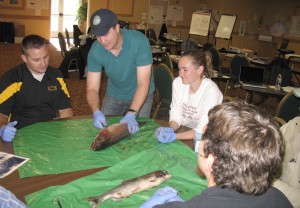Rural teachers attend salmon training
September 23, 2011

907-474-5406
9/23/11
Nineteen teachers from rural Alaska will attend a salmon-themed in-service training Sept. 28-Oct. 1 at the Wedgewood Resort in Fairbanks.
The training supports a classroom incubation project coordinated by the Cooperative Extension Service 4-H Natural Resource and Youth Development Program. Other co-sponsors include Alaska Sea Grant and the U.S. Fish and Wildlife Service.
Organizer Peter Stortz, a 4-H natural resource and youth development specialist, said salmon was chosen as a vehicle for a math and science education program because of its economic and cultural value to the communities.
Teachers will learn how to participate in the incubation project and how to use materials to create a yearlong program that integrates watershed monitoring, fisheries, biology, subsistence, management issues, ocean science and climate change. The teachers also will learn about how much seafood they eat, through the examination of isotopes in fingernail clippings, and will monitor water quality and fish species along the Chena River.
Stortz said the incubation program grew out of a request in the early 1990s by Yukon River fishermen, who were concerned about declining salmon runs. 4-H developed the fisheries education program for youth in villages most affected by the decline. The program has grown from the eight original communities to more than 70 communities around the state.
The teachers will represent communities such as Akiachak, Chignik Lagoon, Egegik, Elim, Fort Yukon, Igiugig, Kalskag, Koyuk, Kwethluk, Levlock, New Stuyahok, Newhalen, Sand Point, Stebbins, Togiak, Unalaska, Northway, Tetlin and Haines.
This year’s training was supported by a grant from the Alaska Department of Commerce, Community, and Economic Development.
ADDITIONAL CONTACTS: Peter Stortz at pjstortz@alaska.edu or 907-746-9459.
NOTE TO EDITORS: Stortz is available by cell phone at 907-354-7194. Most of the workshop is in a classroom setting, but more visual, hands-on activity will include a water quality monitoring session from 9-11:30 a.m. Oct. 1 along the Chena River. Contact Stortz for the location.
DC/9-23-11/074-12


